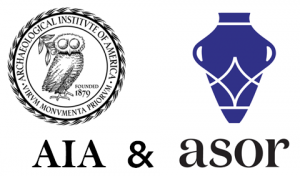
AN ASOR & AIA STATEMENT REGARDING H.R. 1493
Recently, ASOR and the AIA received an open letter raising concerns about H.R. 1493, a bill designed “to protect and preserve international cultural property at risk due to political instability, armed conflict, or natural and other disasters, and for other purposes.” In particular, the letter raised concerns about an amendment added to the bill in the House of Representatives that allows the President to waive the import restrictions for Syrian cultural materials when the owner of the materials wishes to deposit them in the United States temporarily for purposes of safekeeping and preservation. This amendment is part of the bill that is now being considered in the Senate.
The specific concerns about the amendment raised in the open letter are two. First, the letter notes that matters of “ownership” (the “owner of the materials” designated in the amendment) can be very murky, especially in the case of Syria when it is in the midst of a civil war. Who, then, will make fair decisions about proper ownership, and how will those decisions be made? Likewise, who will make decisions about repatriation, and how: what if, say, the “owner” of some object is no longer to be found after the war is over? Second, the letter noted that the designated custodian in this country – a museum, say – might overreach and act as if it were “owner” of an object in its custody, by exhibiting, restoring, conserving or publishing the object, as opposed to granting, say, an owner state the right to control its cultural past.
It is certainly to the good to think through these sorts of cases and try to anticipate what some unintended consequences of the emended H. R. 1493 might be. ASOR and the AIA are convinced, however, that the language of the amendment is carefully drafted to prevent these kinds of worst-case scenarios. For example, while the authority for making decisions about an object’s ownership is assigned to the President, the probability is that this authority will be delegated to the Bureau of Educational and Cultural Affairs in the State Department, which has considerable experience in implementing the larger Convention on Cultural Property Implementation Act of which the import restriction on Syrian cultural materials is a part.
In addition, it is important to note that in order for a waiver to be granted, the President must certify to Congress that granting the waiver “will not contribute to illegal trafficking in cultural property or financing of criminal or terrorist activities.” This means that no one will be granted a waiver unless s/he can prove that the object was not purchased or obtained in any way through looting, which in turn means that all undocumented archaeological objects are absolutely prohibited from being granted a waiver.
While it is true, moreover, that objects brought into the United States under the terms of this waiver might be studied or displayed by some museum that houses them, the housing of such objects in museums – rather than the default, which is a United States Government warehouse – seems to the good. It is also important to remember that it is the foreign owner who initiates the waiver request, and if s/he is not comfortable with a museum displaying, restoring, publishing, and/or conserving some item, the owner could choose not to request a waiver at all or could indicate his/her preferences about the item’s treatment.
Given all this, ASOR and the AIA continue to support H.R. 1493, and we strongly encourage the United States Senate to pass this legislation as quickly as possible so that we may do what we can to help protect Syria’s deeply precious yet highly endangered cultural heritage.
Dr. Susan Ackerman, President
American Schools of Oriental Research
Dr. Andrew Moore, President
Archaeological Institute of America
